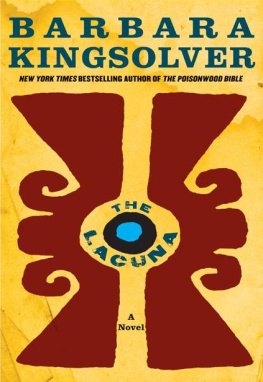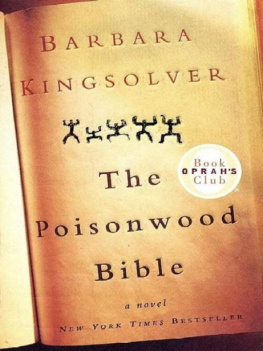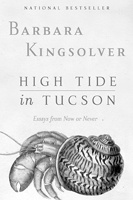Barbara Kingsolver - The Lacuna
Here you can read online Barbara Kingsolver - The Lacuna full text of the book (entire story) in english for free. Download pdf and epub, get meaning, cover and reviews about this ebook. year: 2009, publisher: Harper, genre: Art / Prose. Description of the work, (preface) as well as reviews are available. Best literature library LitArk.com created for fans of good reading and offers a wide selection of genres:
Romance novel
Science fiction
Adventure
Detective
Science
History
Home and family
Prose
Art
Politics
Computer
Non-fiction
Religion
Business
Children
Humor
Choose a favorite category and find really read worthwhile books. Enjoy immersion in the world of imagination, feel the emotions of the characters or learn something new for yourself, make an fascinating discovery.
- Book:The Lacuna
- Author:
- Publisher:Harper
- Genre:
- Year:2009
- Rating:3 / 5
- Favourites:Add to favourites
- Your mark:
- 60
- 1
- 2
- 3
- 4
- 5
The Lacuna: summary, description and annotation
We offer to read an annotation, description, summary or preface (depends on what the author of the book "The Lacuna" wrote himself). If you haven't found the necessary information about the book — write in the comments, we will try to find it.
The Lacuna — read online for free the complete book (whole text) full work
Below is the text of the book, divided by pages. System saving the place of the last page read, allows you to conveniently read the book "The Lacuna" online for free, without having to search again every time where you left off. Put a bookmark, and you can go to the page where you finished reading at any time.
Font size:
Interval:
Bookmark:
The Lacuna
A Novel
Barbara Kingsolver
Contents
Mexico, 19291931
Washington, D.C.
San Angel and Coyoacn
Asheville, North Carolina
Asheville, North Carolina
by Violet Brown
All articles and excerpts from the New York Times used in this text appear as originally published, reprinted with permission.
Diego Rivera, Rivera Still Admires Trotsky; Regrets Their Views Clashed, April 15, 1939.U.S. Forbids Entry of Trotskys Body; Soviet Calls Him Traitor, August 25, 1940.2,541 Axis Aliens Now in Custody, December 13, 1941.Samuel A. Tower, 79 in Hollywood Found Subversive, Inquiry Head Says, October 23, 1947.Truman Is Linked By Scott to Reds, September 26, 1948.The following article excerpts are also used with permission.
Anthony Standen, Japanese Beetle: Voracious, Libidinous, Prolific, He Is Eating His Way across the US, Life , July 17, 1944.Peekskill Battle Lines, Life , September 19, 1949.Frank Desmond, MCarthy Charges Reds Hold U.S. Jobs, Wheeling Intelligencer , February 10, 1950.All other newspaper articles in the novel are fictional. Historical persons are portrayed and quoted from the historical record, but their conversations with the character Harrison Shepherd are entirely invented. This is a work of fiction.
The author gratefully acknowledges the usefulness of Alain Dugrand, Trotsky in Mexico, 19371940 (Manchester, England: Carcanet, 1992); Leon Trotsky, My Life: An Attempt at an Autobiography (New York: Pathfinder Press, 1970); The Diary of Frida Kahlo: An Intimate Self-Portrait (New York: Harry N. Abrams, 2005); Malka Drucker, Frida Kahlo: Torment and Triumph (Albuquerque: University of New Mexico Press, 1995); Hayden Herrera, Frida: A Biography of Frida Kahlo (New York: Harper & Row, 1983); Walter Bernstein, Inside Out: A Memoir of the Blacklist (Da Capo, 2000); William Manchester, The Glory and the Dream (Boston: Little, Brown, 1973); Martha Norburn Mead, Asheville: In Land of the Sky (Richmond, Va.: Dietz Press, 1942); and Hernando Corts, Five Letters of Corts to the Emperor , trans. J. Bayard Morris (New York: Norton, 1969), as well as the estates of Lev Trotsky, Dolores Olmedo, Frida Kahlo, and Diego Rivera for opening these persons homes and archives. Gracias to the Instituto Nacional de Antropologa e Historia (INAH) for its meticulous care of Mexicos historical treasures (notably the Rivera murals) and enduring dedication to public access. Finally, special thanks to Maria Cristina Fontes, Judy Carmichael, Terry Karten, Montserrat Fontes, Sam Stoloff, Ellen Geiger, Frances Goldin, Matt McGowan, Sonya Norman, Jim Malusa, Fenton Johnson, Steven Hopp, Lily Kingsolver, and Camille Kingsolver.
Mexico, 19291931
( VB )
Isla Pixol, Mexico, 1929
In the beginning were the howlers. They always commenced their bellowing in the first hour of dawn, just as the hem of the sky began to whiten. It would start with just one: his forced, rhythmic groaning, like a saw blade. That aroused others near him, nudging them to bawl along with his monstrous tune. Soon the maroon-throated howls would echo back from other trees, farther down the beach, until the whole jungle filled with roaring trees. As it was in the beginning, so it is every morning of the world.
The boy and his mother believed it was saucer-eyed devils screaming in those trees, fighting over the territorial right to consume human flesh. The first year after moving to Mexico to stay at Enriques house, they woke up terrified at every days dawn to the howling. Sometimes she ran down the tiled hallway to her sons bedroom, appearing in the doorway with her hair loose, her feet like iced fish in the bed, pulling the crocheted bedspread tight as a web around the two of them, listening.
It should have been like a storybook here. That is what shed promised him, back in the cold little bedroom in Virginia North America: if they ran away to Mexico with Enrique she could be the bride of a wealthy man and her son would be the young squire, in a hacienda surrounded by pineapple fields. The island would be encircled with a shiny band of sea like a wedding ring, and somewhere on the mainland was its gem, the oil fields where Enrique made his fortune.
But the storybook was The Prisoner of Zenda . He was not a young squire, and his mother after many months was still no bride. Enrique was their captor, surveying their terror with a cool eye while eating his breakfast. That howling is the aullaros , he would say, as he pulled the white napkin out of its silver ring into his silver-ringed fingers, placing it on his lap and slicing into his breakfast with a fork and knife. They howl at one another to settle out their territories, before they begin a day of hunting for food.
Their food might be us , mother and son agreed, when they huddled together inside the spiderweb of bedspread, listening to a rising tide of toothsome roars. Y ou had better write all this in your notebook , she said, the story of what happened to us in Mexico. So when nothing is left of us but bones, someone will know where we went . She said to start this way: In the beginning were the aullaros , crying for our blood.
Enrique had lived his whole life in that hacienda, ever since his father built it and flogged the indios into planting his pineapple fields. He had been raised to understand the usefulness of fear. So it was nearly a year before he told them the truth: the howling is only monkeys. He didnt even look across the table when he said it, only at the important eggs on his plate. He hid a scornful smile under his moustache, which is not a good hiding place. Every ignorant Indian in the village knows what they are. You would too, if you went out in the morning instead of hiding in bed like a pair of sloths.
It was true: the creatures were long-tailed monkeys, eating leaves. How could such a howling come from a thing so honestly ordinary? But it did. The boy crept outdoors early and learned to spot them, high in the veil of branches against white sky. Hunched, woolly bodies balanced on swaying limbs, their tails reaching out to stroke the branches like guitar strings. Sometimes the mother monkeys cradled little babes, born to precarious altitudes, clinging for their lives.
So there werent any tree demons. And Enrique was not really a wicked king, he was only a man. He looked like the tiny man on top of a wedding cake: the same round head with parted, shiny hair, the same small moustache. But the boys mother was not the tiny bride, and of course there is no place on that cake for a child.
When Enrique wanted to ridicule him after that, he didnt even need to mention devils, he only rolled his eyes up at the trees. The devil here is a boy with too much imagination, he usually said. That was like a mathematics problem, it gave the boy a headache because he couldnt work out which was the wrong part of the equation: being a Boy, or being Imaginative. Enrique felt a successful man needed no imagination at all.
Here is another way to begin the story, and this one is also true.
The rule of fishes is the same as the rule of people: if the shark comes, they will all escape, and leave you to be eaten. They share a single jumpy heart that drives them to move all together, running away from danger just before it arrives. Somehow they know.
Underneath the ocean is a world without people. The sea-roof rocks overhead as you drift among the purple trees of the coral forest, surrounded by a heavenly body of light made of shining fishes. The sun comes down through the water like flaming arrows, touching the scaly bodies and setting every fin to flame. A thousand fishes make the school, but they always move together: one great, bright, brittle altogetherness.
Its a perfect world down there, except for the one of them who cant breathe water. He holds his nose, dangling from the silver ceiling like a great ugly puppet. Little hairs cover his arms like grass. He is pale, lit up by watery light on prickled boy skin, not the scaled slick silver merman he wants to be. The fish dart all around him and he feels lonely. He knows it is stupid to feel lonely because he isnt a fish, but he does. And yet he stays there anyway, trapped in the below-life, wishing he could dwell in their city with that bright, liquid life flowing all around him. The glittering school pulls in at one side and pushes out the other, a crowd of specks moving in and out like one great breathing creature. When a shadow comes along, the mass of fish darts instantly to its own center, imploding into a dense, safe core, and leaving the boy outside.
Next pageFont size:
Interval:
Bookmark:
Similar books «The Lacuna»
Look at similar books to The Lacuna. We have selected literature similar in name and meaning in the hope of providing readers with more options to find new, interesting, not yet read works.
Discussion, reviews of the book The Lacuna and just readers' own opinions. Leave your comments, write what you think about the work, its meaning or the main characters. Specify what exactly you liked and what you didn't like, and why you think so.












